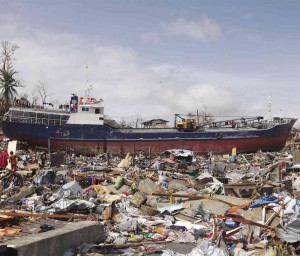Ateneo develops new survival kit in wake of supertyphoons

HARD LANDING A large boat sits on top of destroyed homes after it was washed ashore by strong waves caused by Supertyphoon “Yolanda” in Tacloban City. AP FILE PHOTO
DAVAO CITY—Learning from Supertyphoons ‘‘Yolanda’’ and ‘‘Pablo’’, the engineering department of a university here has designed a survival kit that includes a solar-powered lamp, a cellphone charger and water purifier.
Lourdesita Sobrevega-Chan, head of the research department of the Ateneo de Davao University, said the kit would help keep people alive longer after major disasters before the arrival of aid.
She described the kit as the result of the technical and scientific expertise the university could offer local governments and communities so they could deal more effectively with more powerful typhoons in this era of climate change.
Chan said the impact of Yolanda in the Visayas this month and of Pablo in Mindanao in 2012 prompted university engineers to work on a model kit that will allow typhoon survivors to live several days more before relief and other types of aid could reach them. Yolanda devastated the Visayas
“One of the key lessons we learned from Yolanda and Pablo is that when a strong storm flattens the area, light and water are out,” said Chan. “So, our engineers experimented with the solar panels, and developed a 24-hour survival kit, integrating all these things necessary for people to survive the aftermath of the typhoon,” Chan said.
Article continues after this advertisementShe said university engineers were also looking into the possibility of a food processing kit that would enable typhoon survivors to feed themselves for up to seven days following a major disaster.
Article continues after this advertisementHaving such a kit would be critical for people’s survival, considering the length of time it usually takes for government help to arrive, Chan said.
She said the design of the survival kit would enable even the poorest of the poor to acquire it.
The university was also eyeing partnership with local governments to make it easily accessible to communities that will need them, Chan said.
“Just think, if all barangay captains have that, this can greatly boost the readiness of the communities,” Fr. Daniel McNamara, S.J., an astrophysicist and dean of the School of Arts and Sciences at Ateneo de Davao, said at a science forum called “Don’t be blown away, science will help save the day.”
“How to come up with a gadget with water desalinator is very challenging,” said Chan. “But the engineers are doing it, and as much as possible, using indigenous materials, so that it can be easily accessible to the poorest of the poor.”
Aside from the survival kit, McNamara said, the university was also offering its expertise in putting up more weather stations to monitor the amount of rainfall in critical areas in Davao City, similar to the ones it has already put up.
“What’s going on right now—global warming, climate change—are global phenomena but the impact is local, said Dr. Gemma Narisma, head of the Manila Observatory, who was guest at the forum. “It’s very crucial for us to deal with climate change but all field and scientific disciplines have to come together,” she said. “Hard science research has to be matched up with social science research, because in the end, everything boils down to how these new weather patterns affect the people.”
“Although we deal with the hard science of climate change, we also need to know the key demographic data, we also need to communicate with social science people in tracking vulnerabilities,” she added.